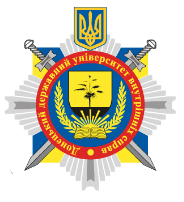CRIMINAL ANALYSIS IN THE SYSTEM OF LAW ENFORCEMENT BODIES OF UKRAINE: CONCERT, PURPOSE AND TACK
DOI:
https://doi.org/10.32782/2523-4269-2023-83-3-9Keywords:
criminal analysis, law enforcement, crime, criminality, analysis, synthesis, analytical activity, analyst.Abstract
The article deals with two types of criminal analysis – analytical search and analytical research. The main content of analytical search is the organization of information in such a way as to facilitate the task of extracting meaning from the collected data. Analytical research involves the establishment of relationships between persons, actions and objects. Analytical research is a form of informational and analytical activity, which consists in an in-depth study of a problem, during which a description of its structure, quantitative and qualitative parameters, as well as the factors that determine it is carried out. In the future, taking into account the need to develop a unified methodological approach to the organization of intelligence analytics and the need to increase the effectiveness of combating crime through renewed police activity based on data collection and analysis, a decision was made to create an independent structural unit, the main task of which was the organization and implementation of information – search and information-analytical work for the implementation of police powers. Knowledge about criminal analysis – its types, forms, areas, conditions and possibilities of application – should be widely promoted, especially among persons who are directly and indirectly involved in the process of fighting crime. Knowledge, competence and qualifications in the field of criminal analysis must be possessed to varying degrees by both criminal analysts and their management at all levels of management, as well as persons who carry out investigative and operative actions, conduct inquiries and investigations. In the current situation, the proper use of criminal analysis is an undeniable duty of all institutions to combat illegal activities. However, there remain many problematic points related to the definition and unified understanding of the concept and types of criminal analysis, regulatory and legal regulation of its use in operational and investigative activities and, accordingly, in the practical activities of operational units of the National Police of Ukraine, application of the results (products) of criminal analysis, etc. Therefore, the main goal of criminal analysis is to improve the mechanisms of prevention, detection, documentation and investigation of criminal offenses, as well as the establishment of mechanisms for monitoring the criminogenic situation, exchange of information at the regional, state and international levels regarding trends and risks in this area. Further development of criminal analysis and its adaptation to the peculiarities of national legislation and the system of combating crime will ensure a rational distribution of law enforcement resources and will significantly affect the reduction of the level of crime in Ukraine.
References
Наказ Національної поліції від 8 квітня 2016 року № 296.
Наказ Національної поліції від 20 липня 2017 року № 735.
Наказ Національної поліції від 31 жовтня 2019 року № 1110.
Наказ Національної поліції від 29 грудня 2019 року № 1354.
Про затвердження Змін до деяких нормативно-правових актів Міністерства внутрішніх справ України з питань діяльності Національної поліції України : Наказ Міністерства внутрішніх справ від 2 липня 2020 року № 504. URL: https://zakon.rada.gov.ua/laws/show/z0675-20#Text.
Наказ Національної поліції від 12 березня 2020 року № 202.
Наказ Національної поліції від 10 червня 2020 року № 424.
Федчак І.А. Основи кримінального аналізу : навчальний посібник. Львів : Львівський державний університет внутрішніх справ, 2021. 288 с.
Основи кримінального аналізу: підручник / А.М. Бабенко, О.М. Заєць, В.А, Некрасов, К.Ю. Ісмайлов, Д.О. Пефтієв та ін. / за заг. ред. О.Є. Користіна. Київ, 2020. 296 с.
Zaiets O.M. The Institute for Analytical Support of Pre-trial Criminal Proceedings in Ukraine: current status and prospects of development. European Reforms Bulletin. 2017. № 1. P. 54–62.
Заєць О.М. Інститут аналітичного супроводження досудового розслідування кримінального провадження в Україні: сучасний стан і перспективи розвитку. Вісник кримінального судочинства. 2016. № 4. С. 17–25.
Zaiets O.M. Application software IBM I2 ANALYST'S NOTEBOOK in law enforcement Ukraine for pretrial investigation of criminal offenses. European Reforms Bulletin. 2016. № 1. P. 69–72.
Про схвалення Стратегію розвитку органів системи Міністерства внутрішніх справ на період до 2020 року : Розпорядження Кабінету Міністрів України від 15.11.2017 № 1023-р. URL: https://zakon3.rada.gov.ua/laws/show/1023-2017-%D1%80.
Довідник керівника поліції – поліцейська діяльність, керована розвідувальною аналітикою (ILP) / О.Є. Користін, Д.О. Пефтієв, С.В. Пеньков, В.А. Некрасов / за заг. ред. М.Г. Вербенського. Київ : Людмила, 2019. 120 с.
Ісмайлов К.Ю. Теоретико-правові підходи до проблем інформаційно-аналітичної діяльності Національної поліції на сучасному етапі державотворення. European Reforms Bulletin. 2019. № 2. Р. 109–115. URL: http://aord.com.ua/wpcontent/uploads/2021/11/European-Reforms-Bulletin_2_2019.pdf.
Пріоритети діяльності Національної поліції України на 2023 рік. Протокол № 1 наради керівництва Національної поліції України від 10.01.2023.





